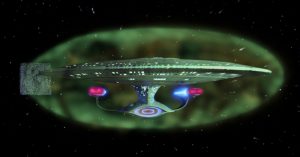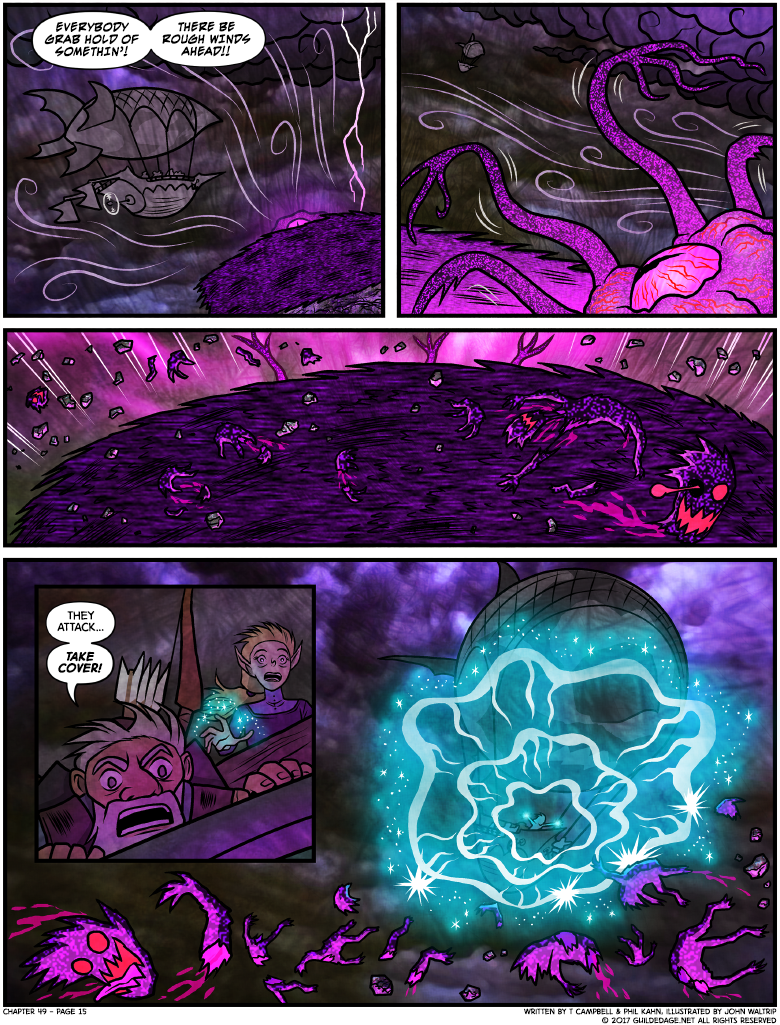Annotated 49-15
 Clair does not want to be here.
Clair does not want to be here.
Her brother is dead. Maybe more of her people are dead, by now—she’s cut off from them, with no way of knowing. She isn’t totally sure she’s alive, herself.
She sobbed herself sick on the battlefield, holding Hollister’s body ’til it grew cold. Briefly, she wondered if she could follow Gravedust’s lead and sacrifice her magic just to return him to life…but no, she had talked enough with Gravedust and E-Merl to know that door was closed. Hollister was gone.
But his remains still deserved better treatment than to be lost among the pile of war-dead. Weak as she was, she couldn’t bear the thought of failing him that way. So, as is the custom of her people, she incinerated the body, levitated the ashes into some semblance of his face, then let him blow away on the wind. The winds down here at land-dwellers’ level were much less powerful than the winds of Asallah En-Qu’Lara. But they would do.
And then the purplezerkers attacked.
She could hardly stand, let alone fight them effectively. She would probably have joined her brother in the Dusk Without Dawn…if Frigg hadn’t snatched her up, streaking them both toward the walls of Gastonia. Through the rest of the team’s activity—the dashing around to unite key warriors, the strategy session in the capital, the takeoff in the goblin’s airship, the approach to the angry god at the heart of all this—Clair remained a mute observer. Once, she and Hollister would’ve laughed, delighted, at the flying contraptions the others now wore, machines their elders had mocked as impossible. Hollister. She could always talk to him. Without him, talking seemed pointless.
Part of her remembered how her mother had warned them of the dangers of the new. And now here they were, cut off from home, Hollister just a memory, and herself rescued—for what? In case one of her “new friends” needed a portal somewhere? Would they have even thought to save her, if not to use her for that? She’d help save their lives more than once, been their reliable “taxi service” around all known Arkerra, and what had they really repaid her with but sorrow?
Quietly, but still audibly over the thunder, her mind spoke the answer: The tools to deal with sorrow. The hope that tomorrow can be better, that it can be different. She’d almost lost that hope, as her society had clung to its old ways and she and her brother had kept getting shouted down by reactionaries. Until the humans (and wood elves, half-elves, dwarves, and gnomes) had arrived, bright and shining with possibility. She’s watched them suffer losses as shattering as her own. She’d watched them wallow in them. She’d watched them slowly rise back to their feet. And she watches them now, carrying on in the name of that hope, bravely enough to spit in the eye of a god.
Clair does not want to be here. She wants to be in the past, when her mother would hold her and Hollister together on her legs and sing them tunes of landbound days spent in and around the Eylu S’Nari Temple. Failing that, she wants to be in bed, pretending to sleep, hugging her sides and mewling out the pain of the hole that’s opened up inside her.
But this hope-eating god would kill her heroes, make Hollister’s sacrifice meaningless, make her own life meaningless. Weak as she is, she can’t bear the thought of failing in the face of that.
She summons her shield. It is wavery. It is wobbly. It is watery.
But somehow, it is sufficient.
FB: This isn’t really what people have in mind when they talk about “sharp elbows.”











Damn. That substory hits you right in the feels. Nice one.
This was a good little story, thanks.
A very moving story. And big compliment to Waltrip, who already halfway told it in Claire’s expression alone!
A glimpse into what a prose novel version of this story might have been like.
Dusk without Dawn, I like that. Especially when you try to imagine what Dawn looks like from Asallah En-Qu’Lara and then contemplate its absence.
Generally speaking, Flo’s action sequences are light on stuff that holds my attention. A prose description with some character development is very welcome here.
Go Claire GOOOOOOOO!!!!!!!!